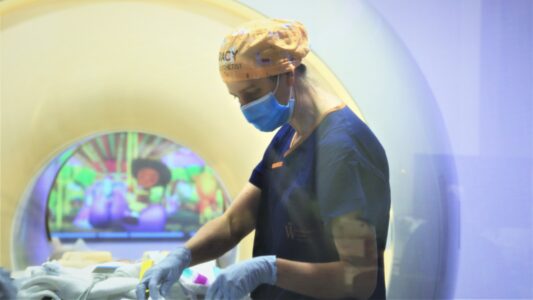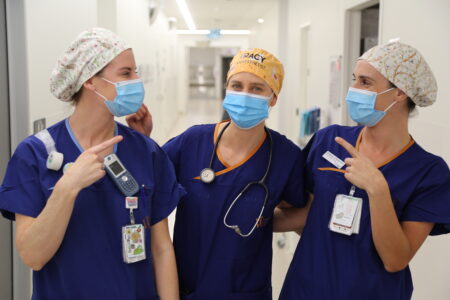
A number of our employees are taking on the #TheatreCapChallenge in their perioperative attire.
The #TheatreCapChallenge is a growing cultural practice of wearing theatre caps where the name and role of the wearer are clearly displayed.
Dr Tracy Jackson, Specialist Anaesthetist collaborated with Infection Prevention and the Sustainability Committee for the use of reusable cloth hats for perioperative attire.
“It’s essential we make environmentally sustainable choices while ensuring patient care and safety is upheld.”
“This low-cost initiative has become a global movement for patient safety and has been taken up by multiple hospitals around Australia.”
“We really want our teams to embrace reusable cloth theatre caps. There are several benefits including cost savings, decreasing our environmental impact and, for those taking up the theatre cap challenge, an increase in communication and patient safety.”

Getting ahead on communication
Identifying employees can be difficult, especially when personal protective equipment (PPE) and masks are in use. Like wearing a name badge as part of our practice in patient-centred care, wearing a labelled theatre cap can also help with communication.
“Theatre is an area where it is not always possible to wear name tags.”, says Dr Jackon.
Even when introductions occur in a team, name recall has been shown to be poor. The #TheatreCapChallenge is particularly helpful to clinicians working at various campuses, sites and areas, or in areas such as emergency theatre when you’re working with different clinicians all the time.

Topping up on patient safety
According to the World Health Organisation (WHO), communication errors are the implied cause of nearly 70% of adverse events. Further studies demonstrated communication failures occur in approximately 30% of theatre team exchanges and a third of these have immediate effects such as causing inefficiency and tension. These risks can be reduced by embracing the #TheatreCapChallenge.
Studies have shown that knowing and recognising team members by name has been associated with increased trust, work engagement and clinical improvement. Using people’s names has also been shown to improve the exchange of information which results in more effective teams and improved patient safety.
Hang your hat on your theatre cap
Employees taking on the #TheatreCapChallenge have embraced the opportunity to pick or create colourful designs and patterns when making or purchasing their own reusable cloth hats. These additional visual cues can help with recalling the identity of an employee. Moreover, if a labelled theatre cap gets lost or goes through the laundry, it will be easier to be found and return to its owner.
Multiple local companies sell reusable cloth hats in a variety of designs and patterns with the option to print or embroider the name and designation of the wearer. Please ensure your reusable cloth hat meets the requirements in the Perioperative Attire, Food, Beverage, and Mobile Phone Usage in Operating Suite Procedure on Prompt.

Hats off on to the #TheatreCapChallenge and reusable cloth hats!
From her research and personal experiences of working in various clinical areas, Dr Jackson encourages fellow employees who use perioperative attire to embrace the #TheatreCapChallenge.
“One of our anaesthetic fellows Angela Wong recently coordinated a survey with theatre employees including nurses, surgeons, and anaesthetists. From the 183 respondents in the survey, 124 (68%) were supportive with 15 (12%) of those supporters already using named hats, 27 (15%) were against it, and a further 32 (17%) felt neutral towards wearing named theatre hats.”
For employees utilising perioperative attire, take on the #TheatreCapChallenge today.
Approved by Cath Cronin, Interim Chief Operation Officer – Acute Services and Paul Butler, Interim Executive Director, Office of Chief Executive

